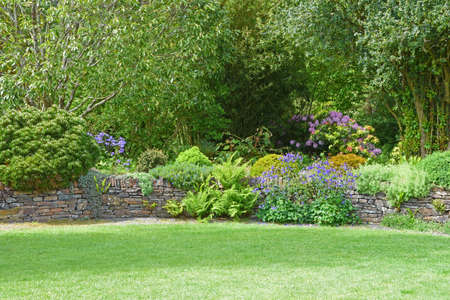The Heritage and Significance of British Gardens
Gardens have long been woven into the fabric of British life, transcending mere aesthetics to become sanctuaries that nurture both body and spirit. From the stately grounds of historic country estates to the cherished allotments nestled within bustling cities, gardens are integral to how Britons interact with their homes and communities. Traditionally, these green spaces were seen as symbols of pride and self-sufficiency—places where families could grow their own produce, share seeds with neighbours, or simply enjoy a moment’s pause amidst fragrant blooms. Over generations, gardens have played a pivotal role in shaping community bonds, fostering resilience during times of hardship, such as the Dig for Victory campaign during World War II. Today, this heritage endures as people across the UK continue to find solace and connection in their gardens, not only maintaining cherished traditions but also inspiring new ways to enhance wellbeing and sustainability at home.
Gardening for Wellbeing: Mind, Body, and Community
In the heart of British life, gardens are more than just patches of green; they are vital sanctuaries that nourish mind, body, and community. Tending to a home garden offers a wealth of wellbeing benefits perfectly suited to the UK’s unique rhythms and traditions. Whether it’s the gentle activity of pruning roses or chatting with neighbours over allotment fences, British gardening culture is intertwined with daily life, enhancing physical health, mental resilience, and social connection.
Physical Health: Everyday Exercise at Home
Gardening is an accessible way for people of all ages to keep active without the need for expensive gym memberships. The regular movement involved—digging, planting, weeding—counts as moderate-intensity exercise. For many Brits, especially older adults or those working from home, this practical activity helps maintain mobility and cardiovascular health.
| Activity | Calories Burned (per hour) | Physical Benefit |
|---|---|---|
| Mowing the Lawn | 250-350 | Strengthens legs & core |
| Weeding | 200-300 | Improves flexibility |
| Planting & Digging | 250-400 | Enhances endurance & strength |
Mental Wellbeing: A Sanctuary in Your Own Back Garden
The therapeutic effects of gardening are well recognised across Britain. Spending time outdoors surrounded by greenery can help reduce stress and anxiety—a welcome antidote to the pressures of modern urban life. Many find that nurturing plants brings a sense of purpose and achievement. Even in small spaces like city balconies or shared courtyards, cultivating flowers or herbs offers moments of mindfulness and calm that support emotional balance.
Mindfulness Practices in the Garden:
- Savouring morning tea while observing birds among the hedgerows
- Tuning into the textures and scents while deadheading blooms
- Taking quiet breaks to listen to rainfall on greenhouse glass
Social Connection: Building Community Through Shared Spaces
Gardens serve as communal hubs in British towns and villages. Allotments and community gardens foster intergenerational connections and neighbourly support. Sharing surplus produce or swapping seeds creates opportunities for meaningful interaction—a hallmark of British hospitality. These green spaces provide safe venues for local events, from plant swaps to garden fêtes, strengthening neighbourhood ties and promoting collective wellbeing.
Key Social Benefits of Home Gardening:
- Encourages friendly conversations with neighbours over the fence
- Presents chances to participate in local garden clubs or competitions (such as Britain in Bloom)
- Promotes intergenerational learning through family gardening projects
Cultivating a garden at home is not just about beautiful borders or growing your own veg—it’s a holistic approach to wellbeing rooted in everyday British living. From enhancing physical fitness to building resilient communities, gardening remains a cherished tradition that continues to nurture both people and planet.

3. Native Plants and Seasonal Growing in the UK
When it comes to cultivating a truly sustainable British garden, the choice of plants is paramount. Opting for indigenous British species not only pays homage to the nations natural heritage, but also supports local wildlife and encourages a resilient ecosystem within your domestic space. Native plants such as bluebells, foxgloves, and primroses are naturally adapted to the UK’s climate and soils, requiring less water and fewer chemical interventions than non-native alternatives.
Understanding and working with the UK’s distinct seasonal cycles further enhances both sustainability and personal wellbeing. By planting according to the rhythm of spring bulbs, summer perennials, autumn foliage, and winter evergreens, gardeners create dynamic spaces that evolve throughout the year. This approach promotes biodiversity by providing food and shelter for pollinators and birds all year round.
Moreover, embracing seasonal growing encourages a mindful connection with nature’s ebb and flow—inviting you to slow down in winter, celebrate abundance in summer, and reflect on renewal each spring. In this way, choosing native plants and respecting seasonal cycles transforms your garden into a living tapestry that nurtures both people and planet—an authentically British approach to sustainable wellbeing at home.
Sustainable Practices: Water, Wildlife, and Waste
In the heart of British gardening lies a deep respect for nature’s rhythms and a commitment to sustainability. Embracing eco-friendly practices not only enhances wellbeing at home but also contributes to a greener, more resilient environment. Here are some key sustainable approaches widely adopted by gardeners across the UK:
Rainwater Collection
Given the unpredictable British weather, rainwater harvesting is both practical and sustainable. Installing water butts to collect rainwater from roofs allows households to nurture their gardens even during dry spells, reducing reliance on mains water. This method not only saves money but also helps conserve precious resources.
Benefits of Rainwater Collection
| Benefit | Description |
|---|---|
| Cost-saving | Reduces household water bills |
| Resource Conservation | Limits use of treated tap water for gardening |
| Plant Health | Rainwater is free from chemicals found in tap water |
Encouraging Local Wildlife
British gardens have long been sanctuaries for native species. By planting wildflowers, leaving sections of grass uncut, and installing features such as bird boxes or insect hotels, gardeners support local pollinators and create habitats for hedgehogs, birds, and beneficial insects. These simple acts foster biodiversity and maintain the delicate balance of urban ecosystems.
Wildlife-Friendly Gardening Tips
- Choose native plants to attract bees and butterflies
- Create log piles or stone heaps for sheltering insects and amphibians
- Avoid pesticides to protect pollinators and soil health
Composting: Closing the Loop
Composting is an integral part of sustainable British gardening. Turning kitchen scraps and garden waste into rich compost reduces landfill contribution and provides nutrient-dense material for beds and borders. Many households use traditional compost bins or even community composting schemes to help close the waste loop locally.
Common Compostable Materials in British Households
| Kitchen Waste | Garden Waste |
|---|---|
| Vegetable peelings Tea bags (plastic-free) Eggshells Coffee grounds |
Lawn clippings Leaves Pruned branches Dead flowers |
By weaving these sustainable practices into daily life, British gardeners create outdoor spaces that nurture both people and planet—demonstrating that domestic wellbeing goes hand-in-hand with environmental stewardship.
5. Turning Small Spaces into Green Retreats
Even in the heart of Britain’s bustling cities, there is always room for nature to thrive. Urban dwellers often believe that a lack of a traditional garden limits their connection with the outdoors, but city balconies, terraces, and even modest allotments can be transformed into restorative green havens. With thoughtful planning and a touch of creativity, these compact spaces become vital sanctuaries for both wellbeing and sustainability.
Reimagining Your Urban Oasis
The British fondness for gardening needn’t be confined to sprawling lawns or countryside plots. Begin by assessing your available space—no matter how petite. Balconies can host vertical planters or hanging baskets brimming with pollinator-friendly blooms like lavender or cosmos. Terraces are perfect for container gardens filled with culinary herbs such as rosemary, chives, and mint, while even window boxes offer an opportunity to introduce bursts of greenery to city living.
Choosing Plants Wisely
Selecting the right plants is crucial for success in limited spaces. Opt for native species that thrive in Britain’s climate and support local wildlife. Consider hardy evergreens for year-round interest or climbers like clematis and honeysuckle to maximise vertical growth. For those with a suntrap balcony, Mediterranean herbs provide fragrance and flavour while requiring minimal care.
Creating a Restorative Ambience
Transform your small garden into a retreat by integrating sensory elements: rustling grasses, scented flowers, and wind chimes evoke tranquillity amidst urban hustle. A bistro table and chair set encourages mindful moments over morning tea or evening unwinding. Add bird feeders or bee hotels to nurture biodiversity and bring gentle wildlife encounters to your doorstep.
Sustainable Practices on a Small Scale
Urban gardening also offers an opportunity to embrace sustainable living. Collect rainwater in small barrels for watering, use peat-free compost, and upcycle containers from household items like old teapots or wooden crates. Grow-your-own vegetables—such as salad leaves, radishes, or dwarf beans—support self-sufficiency and reduce food miles.
With intention and imagination, even the most compact British space can blossom into a green retreat that nurtures body and mind while treading lightly on the planet.
6. Community and Sharing: The Allotment Tradition
The British allotment movement is a cherished tradition that exemplifies how shared gardening spaces can bolster both sustainability and a sense of community. Allotments, which have their roots in Victorian Britain, were originally created to provide urban dwellers with small plots of land for growing their own food. Today, these green pockets continue to thrive across towns and cities, serving as communal hubs where neighbours come together with a common purpose.
Beyond the practical benefit of cultivating fresh, home-grown produce, allotments foster collaboration and knowledge-sharing among local residents. People from all walks of life exchange seeds, gardening tips, and even surplus harvests, ensuring that resources are used wisely and nothing goes to waste. This spirit of sharing not only reduces environmental impact but also strengthens social ties—a key ingredient in personal and collective wellbeing.
Many communities use allotments as platforms for educational workshops or seasonal celebrations, weaving them into the fabric of daily life. Children learn about nature’s cycles hands-on, while adults rediscover the joys of outdoor activity and mindful living. In this way, the allotment tradition supports sustainable practices like composting and organic gardening, inspiring participants to adopt greener habits at home.
For those seeking greater balance in their lives, engaging with an allotment plot offers a gentle rhythm in tune with the seasons. It provides a peaceful sanctuary away from screens and stress, where one can nurture both plants and friendships. The collective effort required to maintain these spaces ensures that everyone benefits—not just from the fruits of their labour, but also from the enduring sense of belonging that comes from working side by side with neighbours.
Ultimately, British allotments are much more than patches of earth; they are living examples of how shared green spaces can enhance domestic wellbeing while nurturing sustainability within communities. By embracing this time-honoured tradition, we can cultivate resilience—both in our gardens and in our relationships with those around us.


